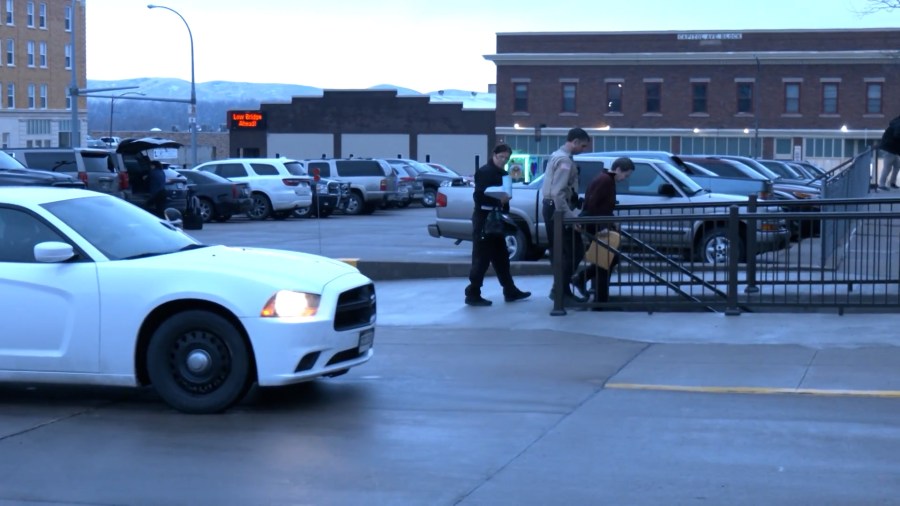PIERRE, S.D. (KELO) — A jury is now in place for the trial of the former employee accused of stealing more than $1.7 million from the South Dakota Department of Social Services.
The 12 jurors and two alternates who will decide whether Lonna Carroll is guilty were seated shortly before noon. They were selected from a pool of more than 50.
Opening statements were set to begin after the criminal proceeding reconvenes at 1:15 p.m.
State Attorney General Marty Jackley is leading the prosecution team.
Carroll’s court-appointed defense attorney is Tim Whalen of Lake Andes.
Carroll, looking gaunt and pale, appeared in court on Tuesday wearing a brown top and black slacks. She has been in the Hughes County Jail since her arrest last year because she hasn’t been able to post bond.
Circuit Judge Christina Klinger ordered that Carroll be allowed to wear street clothes for the trial. Carroll arrived at the Hughes County Courthouse from jail around 8 a.m., driven in an unmarked white sedan and wearing jail-issue orange with shackles on her wrists and ankles.
Deputies immediately took Carroll downstairs through a side entrance to the courthouse basement, where she was allowed to change. Her defense attorney arrived a few minutes later.
Questions asked by Whalen and Jackley to prospective jurors made clear some of the strategies they intend to use at trial.
Whalen said the burden of proof is on the prosecution. “As a defendant, I don’t have to prove anything,” he told them. “Will anybody hold against my client if she elects not to testify?” No one raised a hand.
Whalen went through the list of state witnesses several times, asking whether anyone in the jury pool knew them and asking whether that would prevent them from reaching a fair decision. He also asked whether they had heard news media reports about the case.
One of the pool who eventually was excused was a recently retired DSS employee who said he had heard a lot of talk about the case by others in the department. “I kind of got an opinion early on based on what people were talking about,” he said.
Whalen then asked the man, “In your heart of hearts, can you get it out of your head?”
“No,” the man replied.
Jackley then questioned the man and objected to Whalen’s challenge. Responded Whalen, “Trying isn’t good enough.”
Judge Klinger decided to excuse the man. “Thank you for your honesty,” she told him.
Another woman who identified herself as a state government employee said she’s familiar with the state’s voucher process because that’s one of her responsibilities in the department where she works. She said that knowledge could influence her decision.
“You think she’s guilty?” Whalen asked.
“I do,” the woman replied.
Whalen asked whether there was anything he could do in Carroll’s defense to convince the woman otherwise.
“Put on a pretty good case,” the woman replied.
Jackley asked some questions and objected. Judge Klinger then questioned her.
“I’m sad to say I’ve already made up my mind about her guilt,” the woman said.
The judge then excused her.
Whalen also asked prospective jurors about the statute of limitations, whether they were uncomfortable in a case involving a large amount of money, and memberships in organizations that advocate for changing laws.
Jackley likewise asked about media coverage. Almost every prospective juror raised a hand when asked whether they could separate what they had heard and read from what they would hear in the trial.
Jackley then asked a series of questions about whether any of them had ever left their keys in their vehicles. Would it be OK if someone stole that vehicle? No one raised a hand.
He also asked about leaving their houses unlocked when they’re not there. Would it be OK to have someone come in and steal their possessions? “I’d be upset,” one answered. Said another, “Nothing gives the right to come into my house.
Next Jackley asked about a small bank where the teller goes to the bathroom and leaves open the till. No one agreed that was OK, either.
Jackley then asked about direct evidence and circumstantial evidence. He used as an example embezzlement from an office checkbook. Whalen objected. Jackley tried to go through some examples of ways that embezzlement could be proven, such as looking at the account balance and bank statements.
Then Jackley asked, “How about the way somebody’s living?”
Judge Klinger told him to move on to another question.


